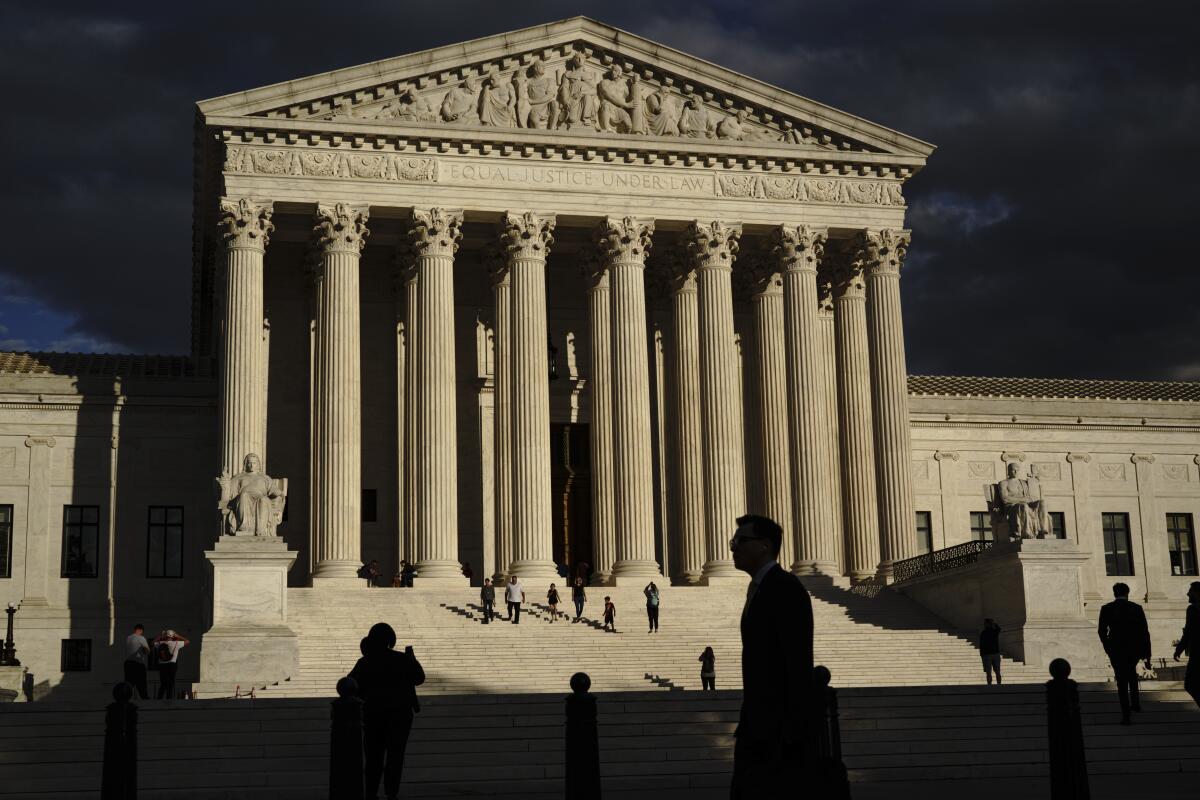Supreme Court skeptical of FBI’s claim in monitoring of Orange County Muslims

- Share via
WASHINGTON — For the second time in two months, the U.S. government on Monday urged the Supreme Court to invoke “state secrets” to shield it from allegations of wrongdoing — in this instance, the secret recording of Muslims who gathered for prayer at an Orange County mosque.
A Justice Department attorney said the court should dismiss a 10-year-old lawsuit that alleges Muslims were targeted for secret surveillance because of their faith, a violation of the religious freedom protected by the Constitution.
The claim should not be decided before a judge or jury, said Deputy Solicitor General Edwin Kneedler, because national security would be at risk if the FBI had to explain why it began spying on an Islamic center in Irvine.
But his argument ran into skepticism from across the court’s usual ideological divide, from Justices Neil M. Gorsuch and Amy Coney Barrett on the right to Justices Sonia Sotomayor and Stephen G. Breyer on the left.
For much of the two-hour argument, the justices debated whether to send the case back to California for further hearings before the 9th Circuit Court of Appeals in San Francisco or before U.S. District Judge Cormac J. Carney in Orange County.
Typically, the government raises a state secrets claim if a lawsuit or court proceeding could reveal a military secret or expose a spy who is working for the United States.
This case is different because it involves domestic surveillance of U.S. persons, said UCLA Law professor Ahilan Arulanantham, who represents Yassir Fazaga and two other Muslim men who sued the FBI and several of its agents.
He noted that in 1978, Congress passed the Foreign Intelligence Surveillance Act, which sets rules for judges to decide behind closed doors whether the FBI had good reason for wire-tapping phones or otherwise spying on people to gather intelligence.
Rather than dismiss the case, he said the court should order the district judge to examine the FBI’s evidence before deciding whether the lawsuit may proceed.
The 9th Circuit Court largely adopted this view of the law as a means to balance the investigators’ need for security and the plaintiffs’ right to hold the government accountable for violating the Constitution.
But last December, in the final weeks of the Trump administration, the Justice Department appealed the case of FBI vs. Fazaga, and urged the high court to overturn the 9th Circuit’s ruling and dismiss the lawsuit.
That position also represented the view of the Obama administration and then-Atty. Gen. Eric Holder, who in 2011 filed a declaration seeking to have the suit blocked because it could threaten national security. The Biden administration has now echoed the same view.
In many cases of alleged illegal surveillance, targets have a hard time proving they were spied on by the government. This case is different because the FBI informant eventually joined the plaintiffs’ side.
The case began when the FBI hired Craig Monteilh and paid him to pose as a convert to Islam. In 2006 and 2007, he recorded thousands of hours of conversations and compiled names and phone numbers.
When he began to talk in the mosque about violent jihad, several of the Muslim men reported him to the FBI.
After his story was revealed, Monteilh broke with the FBI and cooperated with the ACLU in bringing the lawsuit.
“We have all the evidence we need,” Arulanantham told the court.
Catherine Carroll, an attorney representing the FBI officials who were sued separately for their role, said it would be unfair to them if the basis for surveillance remains a secret.
She said the court should affirm an earlier ruling by Judge Carney, who said the classified information presented to him showed “the purported dragnet investigations were not indiscriminate schemes to target Muslims but were properly predicated and focused.”
Both of the state-secrets cases now before the court arose in the years after the 9/11 attacks. The George W. Bush administration had pressed to gather information from alleged terrorists who were captured abroad and to expose potential plots in this country.
Last month, the Justice Department urged the court to block two former CIA contractors from testifying to a Polish tribunal about the torture of Abu Zubaydah, a Palestinian man who was wrongly believed to be a close ally of Osama bin Laden.
The waterboarding and other brutal treatment inflicted on Zubaydah was well-known, but U.S. attorneys argued it remained in part a protected secret because the government had not admitted he was held at a “black site” in Poland.
More to Read
Get the L.A. Times Politics newsletter
Deeply reported insights into legislation, politics and policy from Sacramento, Washington and beyond. In your inbox twice per week.
You may occasionally receive promotional content from the Los Angeles Times.











